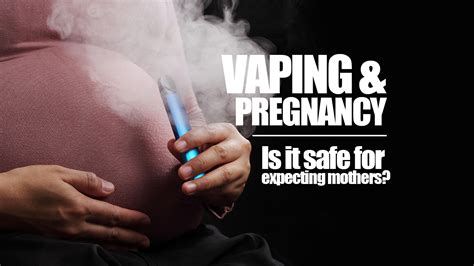Vape While Pregnant: Know The Health Consequences

As the world grapples with the vaping epidemic, a critical aspect that has come under scrutiny is the impact of vaping on pregnant women and their unborn babies. The innocuous perception of vaping as a harmless alternative to smoking has led many to overlook its potential risks, especially during pregnancy. However, it’s essential to understand that vaping while pregnant poses significant health consequences for both the mother and the fetus.
The Emerging Trend of Vaping in Pregnancy
Despite the known risks associated with nicotine and pregnancy, some pregnant women have turned to e-cigarettes, mistakenly believing them to be a safer option than traditional tobacco products. This misconception is partly fueled by the lack of thorough research on the long-term effects of vaping, coupled with aggressive marketing by the e-cigarette industry that often targets younger demographics, including those of childbearing age.
Vaping products, including e-cigarettes, often contain nicotine, flavorings, and other chemicals, the effects of which on a developing fetus are not fully understood. Nicotine, in particular, is a known teratogen, which means it can cause birth defects. Its impact on fetal brain development and the potential for long-term cognitive and behavioral issues in children exposed to nicotine in utero are areas of increasing concern.
Health Risks to the Mother
For pregnant women, the health risks associated with vaping are multifaceted. Nicotine can reduce blood flow, increasing the risk of complications during pregnancy. It can also lead to an increase in heart rate and blood pressure, both of which can be detrimental to the health of the mother and the fetus. Moreover, vaping has been linked to an increased risk of respiratory problems, which can be particularly dangerous for pregnant women due to the already increased demand on their respiratory system.
Risks to the Fetus
The risks to the fetus are equally alarming. Nicotine exposure has been associated with lower birth weights, which can lead to a variety of health issues for the newborn, including a higher risk of respiratory distress, infection, and even sudden infant death syndrome (SIDS). There is also evidence suggesting that nicotine exposure in utero may lead to long-term developmental delays and cognitive impairments in children.
Furthermore, the flavorings and other chemicals in vaping products have been shown to be harmful. For example, diacetyl, a flavoring chemical used in some vaping products, has been linked to a condition known as “popcorn lung,” a severe and irreversible respiratory disease. While the direct effects of such chemicals on fetal development are still being studied, their potential to cause harm cannot be overstated.
The Challenge of Regulation and Awareness
One of the significant challenges in addressing the issue of vaping during pregnancy is the rapid evolution of vaping products and the lack of comprehensive regulation. The e-cigarette industry has been criticized for its aggressive marketing tactics, which often downplay the risks associated with vaping and target vulnerable populations, including youth and pregnant women.
Raising awareness about the dangers of vaping during pregnancy is crucial. Healthcare providers play a vital role in educating pregnant women about the risks of vaping and encouraging those who vape to quit. However, given the stigma associated with substance use during pregnancy, many women may be reluctant to disclose their vaping habits, highlighting the need for non-judgmental, supportive care environments.
Quitting Vaping During Pregnancy
For pregnant women who vape, quitting is the best course of action to protect their health and the health of their baby. While quitting can be challenging, especially due to nicotine’s addictive nature, there are resources available to help. Counseling, support groups, and nicotine replacement therapy (approved by a healthcare provider) can be effective tools in managing withdrawal symptoms and cravings.
Conclusion
Vaping during pregnancy is a serious health concern that warrants immediate attention. The potential risks to both the mother and the fetus are significant, and the lack of comprehensive data on the long-term effects of vaping products only adds to the urgency of addressing this issue. As we continue to navigate the complexities of the vaping epidemic, it’s critical that we prioritize education, support, and regulation to protect the most vulnerable among us.
Is vaping safer than smoking during pregnancy?
+No, vaping is not safer than smoking during pregnancy. Both smoking and vaping introduce harmful substances into the body that can affect the health of the mother and the fetus. Nicotine, whether from tobacco or vaping products, is harmful and can lead to birth defects and developmental issues.
Can I use nicotine replacement therapy while pregnant?
+Nicotine replacement therapy (NRT) should only be used under the guidance of a healthcare provider during pregnancy. While quitting nicotine altogether is the best option, NRT can be safer than continuing to vape or smoke, as it delivers a controlled amount of nicotine without the other harmful substances found in tobacco or vaping products.
How can I get help to quit vaping during pregnancy?
+There are several resources available to help you quit vaping during pregnancy. Consult with your healthcare provider for guidance and support. Additionally, national quitlines and texting services, as well as local support groups, can provide valuable assistance in managing cravings and quitting vaping for good.
In conclusion, while the temptation to vape during pregnancy might seem harmless, the potential health consequences are too significant to ignore. Through education, awareness, and support, we can mitigate these risks and ensure healthier pregnancies and outcomes for mothers and their babies.



